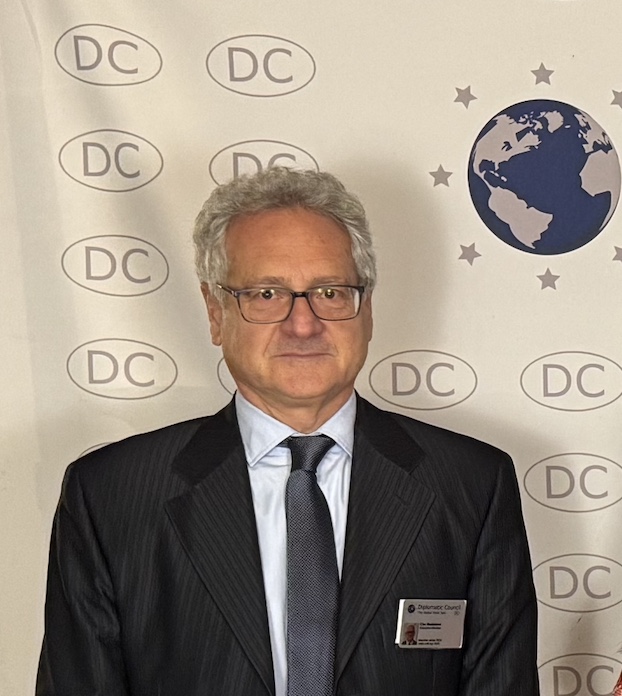Thought Leadership

by Diplomatic Council Member Dr. Ciro Maddaloni*
On the occasion of the New Year celebration, the Diplomatic Council organized a conference at the prestigious Villa Bonn in Frankfurt to present its new work titled "Europe and the Emerging New Global Order."
The book invites reflection on the European security framework and offers insights and ideas for raising awareness about security issues in Europe.
Ambassador Prof. Heinrich Kreft, president of the Diplomatic Council, and Jochen M. Richter, president of the Global Security Forum, provided an overview of this latest work, where they discuss all the security issues in Europe that the Diplomatic Council wanted to summarize in this publication to also provide a guide for its future initiatives at the United Nations.
In his speech, Prof. Kreft outlined five points that represent the main open security issues in Europe.
The first point concerns Russia's aggression towards Ukraine, a war that has been ongoing for three years now and, despite the proclamations by the new U.S. president to end the conflict within 24 hours of his inauguration (January 20), shows no signs of ending. Europe has committed to continuing to support Ukraine's war effort with economic aid and also confirmed on January 27, at the joint meeting of the Council of the European Union, the European Council, and the Foreign Affairs Council, the extension until July 31, 2025, of the harsh sanctions imposed on Russia. Moreover, the possibility of direct military intervention in support of Ukraine is beginning to emerge in some European Union countries.
The second point involves threats to impose tariffs on EU exports to the United States. This involves using the threat of tariffs on goods imported by the U.S. from Europe as leverage to obtain trade concessions from the EU and to balance the trade between the USA and the EU, which is currently heavily in favor of the EU. The U.S. demands increased importation of hydrocarbons and industrial products, including from the defense sector, from Europe.
The third point deals with the reconstruction in the Middle East of the Gaza Strip and Syria with the support of Europe and the USA. However, here too, the U.S. tendency is to turn more to China and India rather than Europe, which are preferred by the new Presidency as interlocutors. This was the issue highlighted by President Draghi in his report on the future of European competitiveness, which, despite having adequate bases to be a highly competitive economy, has experienced reduced growth over the last two decades due to slowing productivity, consistently lower than that of the USA, while China has quickly gained ground. This has led to an increase in the GDP gap between the EU and the United States, making Europe appear weak to global partners.
The fourth point regards the new geopolitical map emerging in the Middle East after the fall of Assad's regime in Syria. Israel has taken advantage of Iran's weakness and Russia's problems in Ukraine to attack and destroy most of the Iranian military installations, significantly reducing the offensive capabilities of both Iran and Syria. From this brief conflict, Russian presence in Syria wanes, and Iran becomes more isolated, having lost its most important proxy in the region. Simultaneously, Turkey emerges as a new military and geopolitical power. This new scenario must be considered for the relaunch of the Abraham Accords, strongly desired by many Arab countries but not well-received by Erdogan's Turkey. Perhaps also for this new situation, Annalena Baerbock, the German Foreign Minister, made a brief stop in Turkey before her visit to Damascus to meet with al-Jolani and the authorities who took power after Assad's fall.
Finally, as the fifth and last point, Prof. Kreft mentioned the attempts by countries of the Global South hoping to have more influence by joining the BRICS. These are countries with limited economic and political weight that hope, by joining the BRICS, to participate in global geopolitical decisions. A signal that should not be overlooked by Western countries, even though it does not yet represent a credible alternative to the current global economic and geopolitical balances.
Reflections that prompt us to think about what the world might become in five or ten years, the challenges that will arise with the new global balances being defined, and what strategies Europe should adopt to maintain a leadership role in this planetary transformation.
* Diplomatic Council Member Dr. Ciro Maddaloni worked 40 years for the private sector (IBM Corporation) and public sector (Italian Government and European Union Institutions), moving from consulting positions to managerial roles, mastering meetings with EU Member States’ stakeholders in the area of Security and Border Management. Nowadays he is retired and writes as a Geo-political Opinionist for the “Giornale Diplomatico” He was Chief Technical Officer of the e-Government For Development Unit, Ministry for Innovation and Technologies of Italy – Italian Presidency of the Council of Ministers. Nominated by Minister Franco Frattini and Minister Lucio Stanca Senior Advisor of the Minister Rashad Omar – Minister of Science and Technology (MoST) – of the new Iraqi government.
Member of the Inter-ministerial Commission (Ministry of Industry-Ministry of Innovation and Technologies). Responsible for the setting up of the ICT infrastructure for the European e-Government Conference (Como July-2003). Member of the evaluation panel for the call for tenders issued by the Galileo Supervisory Authority (GSA) – European GNSS Supervisory Authority. External Independent Expert to support the United Nations Department for Economic and Social Affairs (UNDESA) in Maputo – Mozambique to implement land registry, e-civil identification and Government Electronic Network. He worked for the AFIP – Ministry of Economy (Administración Federal de Ingresos Públicos) to collect Federal taxes in Argentina to meet International Monetary Fund (IMF) directives. From 1992 until 2006 external expert for the European Commission Directorate – General Information Society (IST Programme). He holds a Bachelor.
